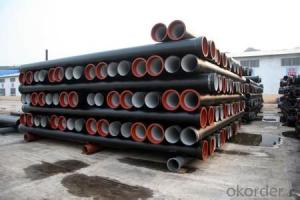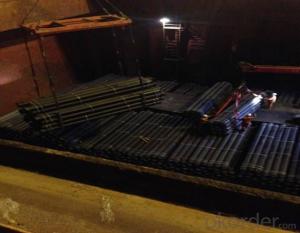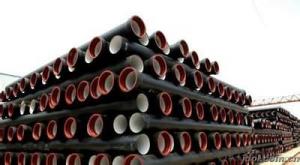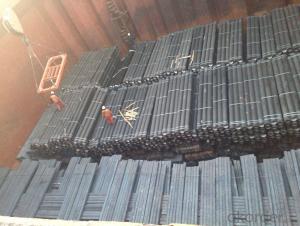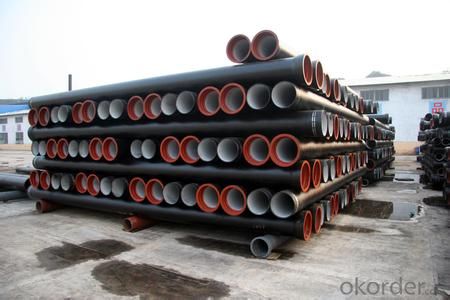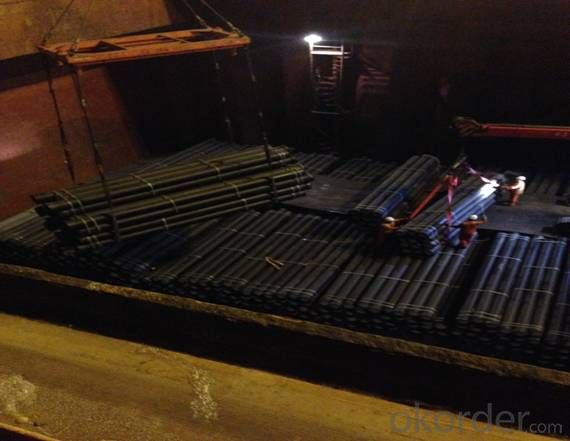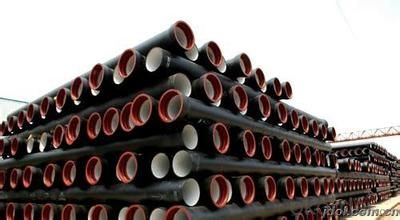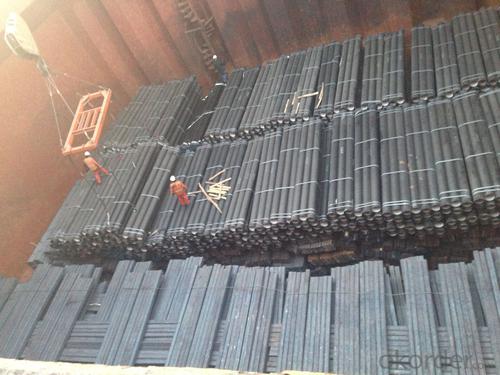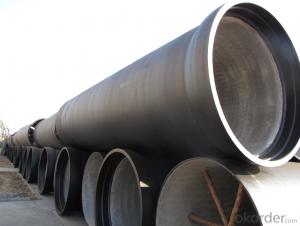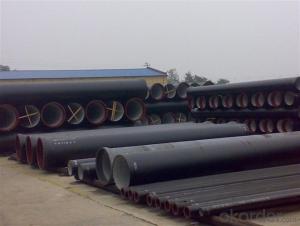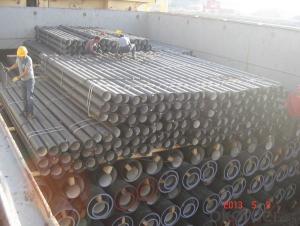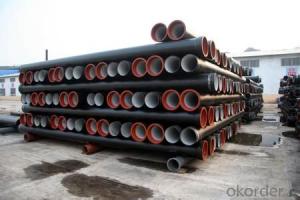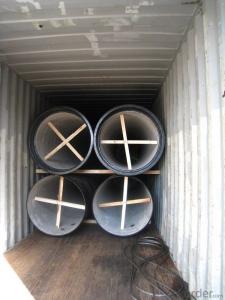DUCTILE IRON PIPE C Class DN125
- Loading Port:
- China Main Port
- Payment Terms:
- TT OR LC
- Min Order Qty:
- -
- Supply Capability:
- -
OKorder Service Pledge
OKorder Financial Service
You Might Also Like
Ductile Iron Cast Pipe is without any defects compare with tradition casting tech, which has many advantages particularly as follow:
(1) High density. In the "vertical upward casting" process, the melt iron of centre liquid column in center crystallizer is continuously feeding for volume shrinkage caused by condensation tube at outer circumference , which lead to be free of shrinkage porosity.
(2) High purity. When melt iron pouring, the mixed impurities such as gas, dross, sand grain which are lighter than melt iron could be eliminated at furnace mouth, its impossible to enter into the crystallizer through the channel, so the melt iron into the crystallizer is very pure.
(3) Strength with toughness. The cooling speed provided by continuous crystallizer is 30 times than sand casting and 5 times than centrifugal casting, and doesn't produce white iron, the eutectic cell volume of continuous cast iron is one eighth to one tenth compare with traditional cast iron. The density of graphite nodule in ductile iron can reach 300-700 pcs/mm2. Therefore, all reason above improve the strength and toughness of continuous cast iron.
(4) Free machining. The high speed cooling make the hardening phase (such as boride, steadite) not appear like reticular, massive or thick, but diffuse like fish bone and pane in shape, moreover, there are tiny graphite flakes inlaid hardening phase. It's free machining in BrinellHardness the range of 250-300HB. However, the Brinell Hardness of 250 is top limit to common metal materials.
(5) Uniform composition of tube wall. The convection mixing of liquid column caused by marching type drawing in crystallizer make the composition of tube wall well-distributed, and concentration gradient very little.
(6) High productivity. To the wall thickness of tube under 10mm, the speed of continuous casting is 1 meter/min, to the wall thickness of tube under 20mm, the speed of continuous casting is 0.5 meter/min, which is high efficiency that centrifugal or other casting tech couldn't reach.
- Q: What is the maximum operating pressure for ductile iron pipes?
- The maximum operating pressure for ductile iron pipes can vary depending on factors such as pipe diameter, wall thickness, and the specific application. However, in general, ductile iron pipes are designed to withstand pressures up to 350 psi (pounds per square inch) or even higher in some cases. It is important to note that local regulations, engineering standards, and manufacturer specifications should be consulted to determine the maximum operating pressure specific to a particular ductile iron pipe system.
- Q: Can ductile iron pipes be used for underground steam distribution systems?
- Ductile iron pipes are well-suited for underground steam distribution systems. They belong to the cast iron family, but have been treated with magnesium to enhance their flexibility and resistance to cracking. Consequently, they can endure high pressure and temperature conditions, making them ideal for underground applications like steam distribution systems. The strength and durability of ductile iron pipes are remarkable, allowing them to withstand the extreme conditions associated with steam distribution. Moreover, their corrosion resistance properties make them a dependable choice for long-term use in underground environments. Nevertheless, it is essential to apply proper insulation to prevent heat loss and ensure the efficiency of the steam distribution system.
- Q: Are ductile iron pipes suitable for use in power plants?
- Ductile iron pipes are indeed appropriate for implementation in power plants. This material, known for its strength and durability, proves capable of enduring high pressure and temperature conditions, thus rendering it an ideal conduit for various fluids like water, steam, and chemicals within power plants. Moreover, ductile iron pipes exhibit outstanding resistance to corrosion, a critical feature for power plants frequently exposed to moisture and chemicals. Furthermore, these pipes boast an extended lifespan and necessitate minimal upkeep, thereby reducing the overall operational expenditures of power plants. All in all, ductile iron pipes provide a dependable and economically viable solution for fluid transportation within power plants.
- Q: Are ductile iron pipes resistant to seismic events?
- Yes, ductile iron pipes are generally resistant to seismic events. Ductile iron is a type of cast iron that is known for its high strength and durability. It has the ability to withstand significant external forces, including those caused by seismic events such as earthquakes. Ductile iron pipes are designed to be flexible and can absorb and dissipate the energy generated by seismic waves. This flexibility allows the pipes to withstand ground movements and vibrations without breaking or cracking. Additionally, the joints of ductile iron pipes are designed to provide some degree of flexibility, which further enhances their resilience against seismic events. Moreover, ductile iron pipes are constructed with thick walls, providing them with a high level of structural integrity. This strength makes them less susceptible to damage during seismic events and helps maintain the flow of water and other fluids even under extreme conditions. However, it is important to note that the resistance of ductile iron pipes to seismic events can also depend on various factors such as the magnitude and proximity of the earthquake, the quality of installation and maintenance, and the specific design considerations for the pipeline system. Therefore, it is crucial to ensure that proper engineering and construction practices are followed to maximize the resilience of ductile iron pipes in seismic-prone areas.
- Q: Are ductile iron pipes resistant to chemicals or solvents?
- Ductile iron pipes possess a general resistance to a wide variety of chemicals and solvents. This resistance can be attributed to their composition, which consists of a high percentage of iron and carbon, as well as small amounts of other alloying elements like silicon, manganese, and magnesium. These alloying elements contribute to the overall strength and durability of the pipes, thereby making them highly resistant to corrosion and chemical attacks. However, it is important to acknowledge that the resistance of ductile iron pipes to chemicals and solvents may vary depending on the specific substance and its concentration. Certain aggressive chemicals or solvents, especially those with high levels of acidity or alkalinity, may gradually corrode or degrade the material of the pipes over time. In such instances, it is advisable to consult the pipe manufacturer or a professional engineer to ensure the compatibility of the pipes with the specific chemicals or solvents being used. Furthermore, the proper installation and maintenance practices are critical factors in preserving the chemical resistance of ductile iron pipes. Regular inspections, cleanings, and the application of protective coatings can assist in extending the lifespan and performance of the pipes when exposed to various chemicals or solvents.
- Q: Are ductile iron pipes suitable for gravity flow applications?
- Yes, ductile iron pipes are suitable for gravity flow applications. Ductile iron is a strong and durable material that can withstand the weight of the water and solid waste flowing through the pipes without any issues. It has high tensile strength and can resist damage from external forces such as soil movement or heavy traffic loads. Additionally, ductile iron pipes have smooth inner surfaces that promote efficient flow and minimize friction losses. They are also resistant to corrosion and can last for decades without requiring frequent maintenance or replacement. Overall, ductile iron pipes are a reliable choice for gravity flow applications due to their strength, durability, and resistance to various environmental factors.
- Q: How to distinguish flexible and rigid interfaces between cast iron pipe joints
- Flexible connections can be kept watertight at any angle (lateral or vertical), and rigid, where the interface of a pipe is easy to crack if a slight earthquake is encountered
- Q: What is the typical weight of ductile iron pipes?
- The typical weight of ductile iron pipes can vary depending on their size and thickness. However, as a general guideline, ductile iron pipes commonly range in weight from around 1 pound per foot for smaller diameter pipes to several hundred pounds per foot for larger diameter pipes. The weight of ductile iron pipes is determined by factors such as the pipe's dimensions, the thickness of its walls, and the specific requirements of the intended application. It is important to note that these weights are approximate and can vary based on the specific manufacturer and product specifications.
- Q: What is the expected hydraulic performance of ductile iron pipes?
- The expected hydraulic performance of ductile iron pipes is generally very high. Ductile iron pipes have a smooth inner surface that promotes efficient flow of fluids, resulting in low friction losses and high flow rates. They have excellent resistance to corrosion and abrasion, ensuring long-term performance in various water and wastewater applications. Ductile iron pipes also have a high tensile strength, allowing them to withstand high internal and external loads without deformation or failure. This makes them suitable for use in both above-ground and below-ground applications, including water distribution systems, sewage and wastewater transport, industrial piping, and irrigation systems. Furthermore, ductile iron pipes have the ability to adapt to ground movement and settle without breaking, thanks to their flexibility and resilience. This makes them a reliable choice in areas with unstable soil conditions or seismic activity. Overall, the expected hydraulic performance of ductile iron pipes is characterized by efficient flow, minimal pressure losses, durability, and the ability to withstand various external forces. These qualities make them a popular choice for water infrastructure projects, ensuring reliable and efficient transportation of fluids for a long service life.
- Q: Do ductile iron pipes require special maintenance?
- Indeed, special maintenance is necessary for ductile iron pipes. Despite their reputation for being strong and durable, ductile iron pipes are still vulnerable to specific types of corrosion. To prevent corrosion and extend the pipes' lifespan, regular maintenance is crucial. This maintenance typically involves conducting periodic inspections to identify any signs of corrosion or damage, as well as implementing cleaning and protective coating procedures. Furthermore, it is important to handle and install the pipes correctly to maintain their integrity. By regularly maintaining the pipes and adhering to industry best practices, one can prevent leaks, breaks, and other issues, ultimately saving valuable time and money in the long term.
Send your message to us
DUCTILE IRON PIPE C Class DN125
- Loading Port:
- China Main Port
- Payment Terms:
- TT OR LC
- Min Order Qty:
- -
- Supply Capability:
- -
OKorder Service Pledge
OKorder Financial Service
Similar products
Hot products
Hot Searches
Related keywords
